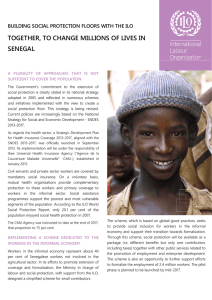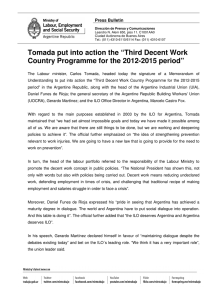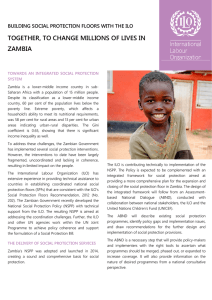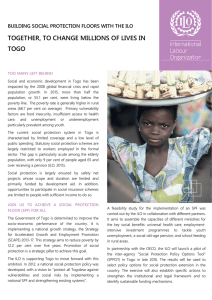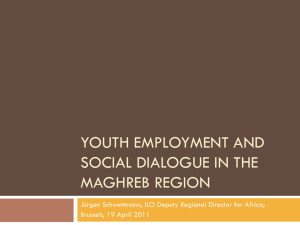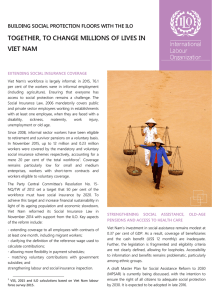Implementation of ILO conventions on rights of associative and
Anuncio
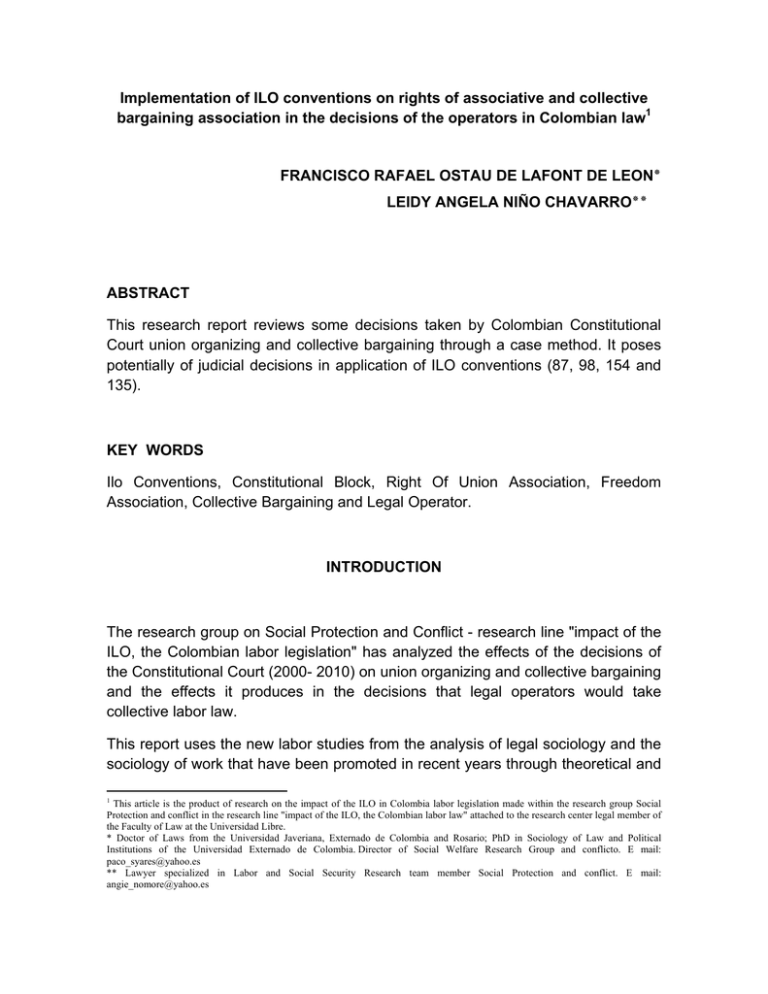
Implementation of ILO conventions on rights of associative and collective bargaining association in the decisions of the operators in Colombian law1 FRANCISCO RAFAEL OSTAU DE LAFONT DE LEON٭ LEIDY ANGELA NIÑO CHAVARRO٭٭ ABSTRACT This research report reviews some decisions taken by Colombian Constitutional Court union organizing and collective bargaining through a case method. It poses potentially of judicial decisions in application of ILO conventions (87, 98, 154 and 135). KEY WORDS Ilo Conventions, Constitutional Block, Right Of Union Association, Freedom Association, Collective Bargaining and Legal Operator. INTRODUCTION The research group on Social Protection and Conflict - research line "impact of the ILO, the Colombian labor legislation" has analyzed the effects of the decisions of the Constitutional Court (2000- 2010) on union organizing and collective bargaining and the effects it produces in the decisions that legal operators would take collective labor law. This report uses the new labor studies from the analysis of legal sociology and the sociology of work that have been promoted in recent years through theoretical and 1 This article is the product of research on the impact of the ILO in Colombia labor legislation made within the research group Social Protection and conflict in the research line "impact of the ILO, the Colombian labor law" attached to the research center legal member of the Faculty of Law at the Universidad Libre. * Doctor of Laws from the Universidad Javeriana, Externado de Colombia and Rosario; PhD in Sociology of Law and Political Institutions of the Universidad Externado de Colombia. Director of Social Welfare Research Group and conflicto. E mail: [email protected] ** Lawyer specialized in Labor and Social Security Research team member Social Protection and conflict. E mail: [email protected] practical analysis (case method). This may generate theories to explain some phenomenon from individual in representative cases from two different times on which will be addressed this paper. The first, with the development of constitutional elements have been used by the Constitutional Court for the application of ILO International Conventions, the second, from the use of case methodology to analyze situations in which the Colombian judicial officers will have to implement international conventions of the ILO directly. In studying the impact of international ILO Conventions ratified by Colombia in the decisions of the judicial, Can the judicial authorities in Colombia directly apply the Conventions 87 and 98 of the ILO, in cases arising in this report? The case methods as a tool for social science research enable analysis based on realities that are conceptualized in the theory. This methodology allows us to theoretically give tools to the judicial argumentation for the decision of specific cases, within the guidelines of contemporary social sciences2 to establish base for decision-making through the fiction of case3. The results of this study demonstrate that judicial officers have the competence to resolve the conflict that arose within the trade unions. They must take into account the criteria of the International Labour Organization through its regulatory agencies to be able to argue the solution to this conflict. The situation will be manifested most clearly in the study case4. 1. CONSTITUTIONAL BLOCK AND ILO CONVENTIONS 2 Feyerbend, Paul K. For and Against Method. The University of Chicago Press; Chicago, IL, United States; 1999 Watkins, John. “Methodological individualism and social tendencies”. Edited by Richard Boyd, P. Gasper y J.D. Trout; The philosophy of science; The MIT Press; Cambridge; 1991;P.733 4 Urrutia Montoya, Miguel; Rodríguez Franco, Diana y otros. Derechos Sindicales y Desarrollo. Universidad de los Andes, Bogotá, 2010. This work does not share the grounds, because labor reform proposed to adapt the Colombian legislation to ILO standards regarding the strike by federations and confederations, allow the right to strike in public services essential and allow collective bargaining in the public sector. Regarding these issues, the group of social protection and conflict does not consider it necessary to produce a reform as the 87 and 98 of the ILO are directly applicable in all aspects of collective bargaining on strike federations and Confederations. There are sufficient criteria for the bodies of control over the rights to strike in essential public services and non-essential (CFA, Note: the right of federations and confederations 730 and 731, the right to strike in essential and nonessential services to 581 584; of the standards committee notes 136 to 179) 3 The Colombian Constitution has stated on Article 53th "international labor conventions that have been ratified are part of domestic law"5. Colombia has ratified 60 Conventions, of which 54 are in force, and 6 are in the process of ratification. The Constitutional Court has built some elements within the constitutional block theory6 (supported by the Preamble and Articles 1, 5, 9, 39, 53, 56, 937, 94, 102 and 214 of the Constitution) from two readings. In the strict sense8, the constitutional block is formed by those principles and norms of constitutional value on which are formed the actual constitution and international treaties. This constitutional block enhances human rights whose limitation is prohibited during states of emergency. In the broad sense9, the constitutional law consists on all those rules in various organizations, which serve as a parameter to ensure the constitutional control. For the Constitutional Court, all international conventions on human rights are part of the constitutional block. In terms of international conventions on work, the Court has expressly decided to include conventions which are not yet ratified by Colombia. The Constitutional Court found that the agreement 87 and ILO convention 98 are part of the constitutional block. Thus, any provision of the Labour Code relating to union organizing and collective bargaining that is contrary to ILO Conventions are unconstitutional provisions, either through direct application of judicial review by the Constitutional Court or by application of an action of unconstitutionality 10. In case of inconsistency between the constitution and the law or other rule of law, constitutional provisions apply under of Article 4 of the Constitution. When the judicial authority or public officers considers that the standards are contrary to the existing constitutional requirements, they may decide the applied law was unconstitutional to inter-party effects that way of exception and deny its application11. 5 Cavelier, Germán. Régimen Jurídico de los Tratados Internacionales en Colombia; Legis; Bogotá; 2000; 3 ed.; P. 249 Corte Constitucional; “Sentencias: C-401/05, C-1001/05, C-047/06, A.V. C-394/07, C-228/09, C-307/09”; Corte Constitucional «www.corteconstitucional.gov.co/relatoria » 7 Corte Constitucional; “Sentencia T 568/99”, reiterado en Sentencia C-567/00 M.P. Alfredo Beltrán Sierra y Sentencia C 038/04 M.P. Eduardo Montealegre Lynett. Corte Constitucional; «www.corteconstitucional.gov.co/relatoria » 8 Corte Constitucional; “S. C-617/08, S. C-228/09, S. C-307/09”. Corte Constitucional «www.corteconstitucional.gov.co/relatoria » 9 Corte Constitucional; Sentencia S. C-401/05, C-1001/05, C-047/06, A.V. C-394/07, C-228/09, C-307/09, (A.V. C-394/07. Corte Constitucional «www.corteconstitucional.gov.co/relatoria » 10 Charry Urueña, Juan Manuel. La excepción de inconstitucionalidad; Ediciones Jurídica Radar, Bogotá; 1994 11 Corte Constitucional. “Sentencia C-600/98. M.P. Dr. José Gregorio Hernández Galindo”. Corte Constitucional «www.corteconstitucional.gov.co/relatoria » 6 The jurisprudence of the Constitutional Court has concluded that the plea of unconstitutionality can be applied automatically and therefore, its use "does not involve an excess of material and personal limits of the process in which it takes place, nor the ignorance of the value regulatory hierarchy. The informal application of the exception of unconstitutionality does not generate, by itself, a form of judicial fact12. The exception of unconstitutionality does not require application by a party in the process by which the judicial officer is obliged to declare. The exception of unconstitutionality is not only an instrument whose competence is at the head of the judges, because it can be applied by any authority and even by individuals. Any rule of law, regardless the rank, may be precluded if it is contrary to the constitution, being the most efficient instrument for the protection of the Charter13. The International ILO Conventions No. 87, 95, 98, 100.11114, 13215, 138, 151, 154, 169 and 18216 are part of the constitutional block by express mandate of the Constitutional Court17. For our study, the ILO Convention 8718 on freedom of association, ratified by Colombia through Law 26 of 1976 concerning freedom of association, enshrined among its principles the right to establish organizations of their own choosing for themselves, without prior authorization, the right to draw up their constitutions and rules. Elect their representatives, to organize their administration and their activities. Formulate their programs, without interference by public authority and the right to free collective bargaining. This agreement is intended to protect the free exercise of the right of association of employers and workers organizations against public authorities19. 12 Corte Constitucional. “Sentencia T-808/07. M.P. Dra. Catalina Botero Marino. C 600/98; C 492/00”; Corte Constitucional «www.corteconstitucional.gov.co/relatoria » 13 Corte Constitucional. “Auto 035/09. M.P. Manuel José Cepeda Espinosa”; Corte Constitucional «www.corteconstitucional.gov.co/relatoria » 14 Corte Constitucional. “Sentencia T 1266 de 2008”; Corte Constitucional «www.corteconstitucional.gov.co/relatoria » 15 Corte Constitucional. “Sentencia C 035 de 2005”; Corte Constitucional «www.corteconstitucional.gov.co/relatoria » 16 Corte Constitucional. “Sentencia S. C-567/00, T-1303/01, C-035/05, S.P.V. C-177/05, C-465/08, C-466/08, C-617/08”; Corte Constitucional «www.corteconstitucional.gov.co/relatoria » 17 Corte Constitucional. “Sentencia C 465 de 2008. M.P. Dr. Manuel José Cepeda Espinosa”; Corte Constitucional «www.corteconstitucional.gov.co/relatoria ». The Court has established that the ILO Convention 87 is part of the block of constitutionality, which means that its rules are a parameter for the trial of the constitutionality of laws. Convention 87 and other ILO conventions regarding the right of association and freedom of association as part of the block of constitutionality, are an additional parameter of Article 39 of the Constitution 18 Von Potobsky, Geraldo. “Freedom of association: The impact of Convention No. 87 and ILO action”; International Labour Review: Special Issue: Labour Rights, Human Rights. Volume 137, Number 2 1998/2. 19 Odero, Alberto and Guido Horacio. Ilo Law on Freedom of Association: Standards and procederes. Geneva, International Labour Office, 1995 The Convention 98, ratified by the Act 27 of 1976 and Convention 15420 ratified by Act 524 of 1999 along with its recommendation 163 of 1981 on the promotion of collective bargaining, established the general principle that no person shall be discriminated against in employment by reason of its business or legitimate trade union membership, this being particularly necessary protection for union leaders. Provides that protection against acts of discrimination must be effective, legislation must contain provisions to protect adequately and enshrine the existence of procedures that will ensure that complaints are examined promptly, impartially, economically and efficiently. These agreements preach the full independence of workers' organizations of employers and their organizations in the conduct of its activities. Convention 154 as the main axis develops the promotion of collective bargaining negotiations involving all those that take place between employers or their organizations and workers' organizations in order to determine the conditions of employment and / or regulate relations between employers and workers and / or regulate relations between employers or their organizations to one or more workers' organizations. The objective of this agreement is to encourage a free and voluntary collective bargaining between parties representing free and informed organizations21. Occurrence of the Conventions 135 and Recommendation 143 of 1971 representatives of workers, including dismissal, based on its capacity as representative22. 20 Glassner Vera; Keune, Maarten. Negotiating the crisis? collective bargaining in Europe during the economic downturn; Geneve; International Labour Office. – Geneva; ILO, 2010 21 Gernigon Bernard; Alberto Odero and Horacio Guido. Collective Bargaining: Ilo Standards And The Principles Of The Supervisory Bodies; Geneva, International Labour Office, 2000. 22 Politakis George P. (Edited by); Protecting Labour Rights as Human Rights: Present and Future of International Supervision . Proceedings of the international colloquium on the 80th anniversary of the ILO Committee of Experts on the Application of Conventions and Recommendations, Geneva, 24-25 November 2006 2. Comments of the Committee on Freedom of Association and the Committee of Experts on the application of conventions and recommendations. The Committee on Freedom of Association23 and the Committee of Experts on the Application of Conventions and Recommendations24 have established criteria and the principles of Conventions 87 and 98, which are mandatory in their application guide25. This monitoring body confronts the situations that are presented to the internal regulations of the States, compared to international standards under the Treaties ratified by the states involved (in this case, the constitution of the ILO Conventions on freedom association) 26. Makes recommendations and submits to the Governing Body, which issues binding recommendations according to the rules governing the organization27. Colombia is obliged to become a State party to the Treaty establishing the ILO, to respect the recommendations of the Board of Directors28. Xavier Beaudonnet29 indicates that any comments or statements made by international monitoring bodies in the case of the ILO are the guide in the interpretation and application of its Conventions30. These comments and recommendations are interpretations and legal documents. However, its legal value depends on the constitution of the ILO, and is valid only until it has come to the International Court of Justice to obtain a definitive interpretation and application of good faith of international treaties31. 23 International Labour Organization. Freedom of Association: Digest of decisions and principles of the Freedom of Association Committee of the Governing Body of the ILO. Fifth (revised) edition Geneva; 2006. 24 International Labour Organization; Freedom of Association and Collective Bargaining: General Survey of the Reports on the Freedom of Association and the Right to Organize Convention (No. 87), 1948 and the Right to Organize and Collective Bargaining Convention (No. 98), Report of the Committee of Experts on the Application of Conventions and Recommendations, 81st Session, 1994, Report III, Part 4A. Geneva, 1994. 25 Corte Constitucional; Sentencia C 465 de 2008. M.P. Dr. Manuel José Cepeda Espinosa. Corte Constitucional «www.corteconstitucional.gov.co/relatoria » "The decisions of the CFA are not recommendations per se, but the guiding principles for the interpretation of the Conventions of the ILO". 26 International Labour Organization. Application of convention no. 169 to indigenous and tribal peoples by domestic and international courts in Latin America - a case book, Ginebra, 2009. 27 Rodgers, Gerry; Swepston, Lee; LEE, Eddy and Jasmien Van Daele. The International Labour Organization and the quest for social justice, 1919-2009. International Labour Organization; Geneva, 2009 Corte Constitucional; “Sentencia 568/99. M.P. Carlos Gaviria Díaz”. Corte Constitucional «www.corteconstitucional.gov.co/relatoria » 29 Beaudonnet, Xavier. International labour law and domestic law Subtitle: Training manual for judges, lawyers and legal educators. OIT; Turin, 2009. P, 92 30 International Labour Office, International Labour Conference, 77th Session 1990. Report III (Parts 1, 2 and 3): Information and Reports on the Application of Conventions and Recommendations. Summary of Reports (Articles 19, 22 and 35 of the Constitution). International Labour Office Geneva 1990. 31 Ibid. P. 93 y 94 Their analysis control agencies on 87 and 98 of the ILO and the interpretation on the application32 of its principles are mandatory, unless a contrary ruling of the International Court of Justice is applied. This approach is supported by the very constitution of the ILO, the Vienna Convention and the decisions of the Constitutional Court. The Constitutional Court has reiterated following the guidelines of the ILO charter that the recommendations are not standards that create international obligations, but guidelines which are to be followed by States parties33 in the research of dignity in the workplace of countries but sometimes the recommendations issued bodies themselves are binding Control34. The constitutional rights and duties must be interpreted according to international human rights treaties ratified by Colombia (Article 93 of Constitution). The jurisprudence of international bodies charged of interpreting a treaty is a hermeneutical approach and interpret the scope and meaning of the constitutional provisions on fundamental rights35 (In the case of Conventions 87 and 98 of the ILO developed specifically to exercise the right of association). All human rights treaties ratified by Colombia, which relate to constitutional rights are part of the constitutional block to determine the scope and content of constitutional rights36. If the rules on right of association and collective bargaining in the Labor Code are inconsistent with ILO Conventions 87 and 98, these conventions are applied directly on the same code. The legal conflict between the constitution, conventions 87 and 98 of the ILO and the labor Code (Decrees 2663 and 3743 of 1950 adopted by the Act 141 of 1961 as permanent legislation), is the existence of two legal models to organize and bargain collectively. The source model is characterized as a model auditor of the organizational and functional structure of trade unions creating a control application is mandatory as was the case of Resolution 4th of 1952 which established the obligation of recourse to the form of the statutes union. 32 Servais, Jean-Michel. International labour law. Kluwer Law International B.V, The Netherlands, 2009. P 71 Corte Constitucional; “Sentencia T 568/99. M.P. Carlos Gaviria Díaz. Sentencia C 200/02 M.P. Álvaro Tafur Galvis”. Corte Constitucional «www.corteconstitucional.gov.co/relatoria » 34 Ibídem. 35 Corte Constitucional; “Sentencia C 010/00. M.P. Alejandro Martínez Caballero. Sentencia T 1319/01 M.P. Rodrigo Uprimny Yepes”. Corte Constitucional «www.corteconstitucional.gov.co/relatoria » 36 Corte Constitucional; “Sentencia C 038/04 M.P. Eduardo Montealegre Lynett.” Corte Constitucional «www.corteconstitucional.gov.co/relatoria » 33 This Code provided for a control of legal recognition and intervention by the executive in resolving labor disputes through binding arbitration courts, creating formalisms in collective bargaining and the declaration of illegality or legality of the work stoppages. Since 1991, with the enactment of the Constitution, the union model began to be transformed by the Constitutional Court, this from the decisions of declaration of unconstitutionality or constitutionality. The idea was to establish a new legal model based on collective bargaining agreements 87 and 98 of the ILO. This model is characterized as a model independent from the will of the parties. 3. Decisions of the constitutional court under the ILO conventions on collective labour law. Some of the decisions of unconstitutionality or constitutionality referred to cases: SU - 342/95, C 096/93, C - 593/93, C - 009/94, C – 110/94, C – 473/94, C 548/94, C 085/95, C - 450/95, C - 075/97, C 432/96, C – 542/97, C - 271/99, C - 385/00, C - 569/00, C 1491/00, C 201/02, C - 063/08, C - 567/00, C - 797/00, C - 1050/01, C - 449/05, C -1188/05, C - 311/07, C - 349/09, C - 674/08, C - 280/07, C 695/08, C - 734/08, C - 466/08, C - 467/08, C - 621/08, C - 627/08, C - 672/08, C 674/08, C - 732/08, C - 465/08, C - 466/08, and C - 1234/05. The Case C 465/0837 declared the constitutionality of Article 370 of the Labor Code in the understanding that the deposit of the modification of trade union rules only meets advertising capabilities, without authorizing the Ministry of Social Protection to conduct a prior investigation on content of the reform. The communication of the changes approved by a union on its board to the Minister equal to the deposit of information before it, so the government cannot refuse to register members of the board who have been appointed compliant to requirements as it would constitute an undue interference of the internal administration of trade unions. The Constitutional Court said that in case of internal conflict on a labor organization or union rules nomination of representatives of workers, it must be the judge to rule on the matter. The Case C - 858/0838 of the Constitutional Court on the basis of article 3 of ILO Convention 87 (in which trade unions set out their plans of action to defend the interests of their members in accordance with Article 10) the same convention has identified several types of strike and defends their interests. In this decision, the Constitutional Court declared enforceable the expression "economic purposes and professional proposals to their employers" (in Article 429 paragraph e) and "if it pursues purposes other financial professionals or" contained in paragraph b) of article 450 of the Standard, understanding that such purposes do not exclude strikes on social, economic or sectoral issues that directly affect the exercise of the activity, occupation, trade or profession.. The Constitutional Court has applied the 87 and 98 of the ILO in some cases directly39 to resolve the constitutionality of a provision of the Labor Code. In other cases it has been used to interpret or develop principles used for arguments for the constitutionality of the rules of the code. 37 Corte Constitucional. “Sentencia C 465/08. M.P. Manuel José Cepeda Espinosa”; Corte Constitucional «www.corteconstitucional.gov.co/relatoria » 38 Corte Constitucional. “Sentencia C 858/08 M.P. Nilson Pinilla Pinilla” Corte Constitucional «www.corteconstitucional.gov.co/relatoria» 39 The Constitutional Court has applied directly to the ILO Conventions. In this regard see: Corte Constitucional Sentencia C 381 de 2000. The cases presented in this report apply directly to Conventions 87 and 98 of the ILO and the recommendations of the supervisory bodies in preference to the rules of the Labor Code in use of the objection of unconstitutionality. 4. METHODOLOGY OF CASES CASE SHEET No. 1: Exercise of the right of association. Application of Article 2 of the 87 directly by the formation of a union of the direct employees of the company, contract workers provide services and cooperative work of the same company. CASE: In a company X, a group of people consisting of 15 contract workers to provide services40, 15 people who provide services through a worker cooperative41 (not linked through their work in the company) and 15 contract workers founded a labor union. In their union statutes provide that union may be affiliated with your organization, any individual serving in Company X when the union was founded the Ministry of Social Protection proceeded to perform the registration in accordance with Article 365 of the Labor Code and Judgment C 465/08. Faced with this situation, we asked to the employment tribunal to annul the union status in relation to the clause of the members and as a result, the cancellation of union registration of a new trade union organization as it did not meet the minimum number of members. BACKGROUND TO THE OPERATOR OF JUDICIAL DECISION. Constitutional. Articles1, 5, 9, 39, 53, 56, 9342, 94, 102 and 214 of the Constitution 40 Corte Constitucional. “Sentencia C – 739/02”; Corte Constitucional, «www.corteconstitucional.gov.co/relatoria ». Can also exercise the right to organize all workers in a company, whether independent contractors, middlemen, casual or temporary workers, contract workers working at home, telecommuters, workers sent by job-placement agency or workers on mission outsourced workers, 41 On the case of cooperative workers, the Committee of Experts on the Application of Conventions and Recommendations in 2008 in its report recommended: “the Committee requests the Government [of Colombia] to take the necessary measures to ensure explicitly that all workers without distinction, including workers in cooperatives and other forms of contracts, regardless of the existence of an employment relationship can benefit from the guarantees the agreement ". The Committee on Freedom of Association in case of Case 2051 of Colombia asked the Government to ensure to ensure that the figure of worker cooperatives is not used to hide the reality of the business and real working relationships with the purpose of harming the unions or their affiliates. However, the opinion issued by the Ministry of Social Protection in the Office of Legal and legislative support on July 24, 2008, contrary to the ILO, said that: "A cooperative partner can not exercise the right to bargain collectively or strike vote, among other things because l be the time associated with the owner of the company, there is no legal possibility to submit a list of demands". In 2009 at the 88 th meeting, the Committee again requests the Government of Colombia to analyze the situation of workers of the cooperative partners on the right to organize. 42 Corte Constitucional. Sentencia T 568/99. Corte Constitucional «www.corteconstitucional.gov.co/relatoria». this statement has been reiterated by the Court Judgement C-567/00 M.P. Alfredo Beltrán Sierra y Sentencia C 038/04 M.P. Eduardo Montealegre Lynett. Legal. Law 26 of 1976 by means of which ratified the Convention 87, law 27 of 1976 by which ratified the Convention 97 in its article 1 of the ILO, Substantive Labour Code, section 353, 356 and procedure code Labour and Social Security Articles 2 and 13, Act 79/88 Decree Act 468/90 and Decree 4588/06 and Act 12331208. National jurisprudence. Judgments C465/08, T 1328-1301, C 211/00, T 445/06, C 154/96, C-674/0843. Decisions of the freedom of association committee and the commission of experts on the application of conventions and recommendations. ILO, recommendation 169 and the 1968 Declaration of Principles of the ILO Other international law. Universal Declaration of Human Rights Articles 20.1 and 23.4, American Declaration of Rights and Duties of Man Article XXII, the International Covenant on Civil and Political Rights, Article 22.1, 22.2, and 22.3, International Covenant on Economic, Social and Cultural Articles 8 to ) d) ratified by Law 74 of 1968 Additional Protocol to the American Convention on Human Rights concerning Economic, Social and Cultural Rights (Protocol of San Salvador) American Convention on Human Rights Article 16.1, 16.2 and 16.3 ratified by Law 16 1972 JUDICIAL REVIEW OF OPERATOR The operator must analyze their labor judicial power to override a clause in an adversarial union status of the national constitution and laws to order the cancellation of union registration. Article 2 of the Code of Labour Procedure as amended by Law 712/01 provides that judges are competent job analysts of trade union rules because the exercise of the right of association is linked to the world of work (not necessarily the formal linkage contract of employment but also by another type of link that determine a job in the company). Any dispute arising from work activity must be solved before the special court work, in accordance with the decision of the Constitutional Court. The labor court decides the legality or illegality of the trade union rules. If the statutes are illegal to allow the affiliation of workers labor ties to the company through an employment contract, and the cancellation of union registration. 43 “es bueno recordar que entre la libertad sindical y la democracia existe una dependencia mutua que, incluso, puede verse como una relación circular, pues es evidente que sólo en Estados democráticos puede garantizarse la verdadera eficacia del derecho a constituir organizaciones sindicales para la defensa de los derechos comunes de un oficio o profesión y que el ejercicio del derecho a la libertad sindical contribuye a afianzar y consolidar la democracia en una sociedad” Corte Constitucional «www.corteconstitucional.gov.co/relatoria » It should be stressed that the operator must deal with this issue justice by the ordinary process of work and not under Article 380 of the Labour Code on dissolution, liquidation and cancellation of registration of trade union registration to be used solely for violations of union prohibitions of Article 379 of the Code as a penalty determined by a court. In relation with the legality or illegality of the clauses of the union status should be noted that Article 2 of the ILO Convention 8744, ratified by Colombia through Law 26 of 1976 states that "workers and employers, without distinction whatsoever without prior authorization have the right to establish organizations of their own choosing as well as to join them on the condition of the rules of the same". Article 3 establishes that workers and employers have the right to draw up their constitutions and rules, to elect freely their representatives, to organize their activities and formulate their programs. The public authorities shall refrain from any interference which would restrict this right or impede the lawful exercise thereof". In this respect the Freedom of Association Committee in notes 216, 209, 254, 255, 258, 260, 261.262, 26345 interpreting Article 2 of Convention No. 87 reiterates the right of all workers without distinction whatsoever, to join organizations of their own choosing and to join them. The expert committee on the Application of Conventions and Recommendations46 of the ILO in notes 45 and 46, has been interpreted as a general principle that all workers regardless of their form of attachment may exercise the right of association. However the direct application of Article 2 of ILO Convention 87 in should be emphasized that Article 39 of the Constitution and Articles 353 and 356 of the Labor Code not establish as a condition for exercising the right of association to be bound by contract to work in a company. The operator is facing judicial situation that the substantive rules of work have established that trade unions are organizations of workers, using this term for occupationally related individuals working under contract, with rules contrary to the Convention 87 ILO. 44 Dunning, Harold. The origins of Convention No. 87 on freedom of association and the right to organize. In: International Labour Review: Special Issue: Labour Rights, Human Rights. VOLUME 137, NUMBER 2 1998/2. 45 International Labour Organization. Freedom of Association: Digest of decisions and principles of the Freedom of Association Committee of the Governing Body of the ILO. Fifth (revised) edition Geneva, 2006. 46 International Labour Organization. Freedom of Association and Collective Bargaining: General Survey of the Reports on the Freedom of Association and the Right to Organize Convention (No. 87), 1948 and the Right to Organize and Collective Bargaining Convention (No. 98), Report of the Committee of Experts on the Application of Conventions and Recommendations, 81st Session, 1994, Report III, Part 4A. Geneva, 1994. They exercise the right to organize all workers in a company, whether independent contractors, middlemen, casual or temporary workers, contract workers working at home, telecommuters, workers sent by job-placement agency or workers on mission and outsourcing workers In the present case, the operator must give preference to the ILO Convention against the rules of the code and state statutes of the trade union in accordance with what is enshrined in the constitution, laws and the constitutional block. CASE SHEET No. 247: Internal Conflict association. Implementation of article 3 of ILO Convention 87 directly against the autonomy of trade unions in the drafting of trade union rules. CASE: A group founded a trade union workers and union statute provides in the following: "The period of the board shall be 10 years and be appointed by the president of the union". In a trade union there is no change in its board of directors and appointments are produced, according to some members of the organization, against the trade union constitution. Some workers seeking employment ask the court for annulment of the clauses of the trade union statutes that conflicted with Article 391 of the Labour Code on the election board in accordance with Case C 466/08. This ruling declared unconstitutional the rule "on a paper written and applying the electoral quotient system. Therefore, the union must apply a democratic election system, that is, with the participation of its members and the periods of trade union representatives shall be in accordance with this principle. BACKGROUND TO THE OPERATOR OF JUDICIAL DECISION CONSTITUTIONAL: ARTICLES 1, 5, 9, 39, 53, 56, 9348, 94, 102 and 214 of the Constitution 47 Téngase en cuenta todos los elementos utilizados sobre competencia y la aplicación directa del convenio 87 y 98 de la OIT para los casos que a continuación se plantean. LEGAL: Law 26 of 1976 by which ratified the ILO Convention 87, article 3. NATIONAL JURISPRUDENCE APPLICABLE. Case C 466/08, C674/08. Decisions of the committee on freedom of association and commission of experts. Recommendation 169, the statement of principles of the ILO 1968. Judicial Analysis Operator. In accordance with ILO Convention 87 on Article 3, it enables organizations of workers and employers to establish organizations of their own choosing and the right to draft its statutes and regulations within the principle of union democracy. The committee on freedom of association in his notes 369-38349 and the Committee of Experts on the Application of Conventions and Recommendations50 have established that trade unions have full autonomy to draw up their constitutions union and are free to choose their representatives. These representations must be designated in accordance with the principle of union democracy, where all members can participate. A ten-year period is contrary to the principle of union democracy, although this precludes the possibility of re-election of employee representatives in accordance with its statutes. The judicial operator directly apply the principle of union democracy enshrined as an essential element of the ILO Convention 87 developed in footnotes 30 and following of the CFA which insists that the democratic system is fundamental to the exercise of trade union rights. The operator must consider whether judicial elections occurred under trade union rules, using the notes of 440 to 45351 CFA and notes 112 to 12521 of the Commission of Experts on the Application of Conventions and Recommendations, recommended that the decision should be given the guarantee of the right of 48 Corte Constitucional. “Sentencia T 568/99”. Dicho pronunciamiento ha sido reiterado por la Corte en Sentencia C-567/00 M.P. Alfredo Beltrán Sierra y Sentencia C 038/04 M.P. Eduardo Montealegre Lynett. Corte Constitucional «www.corteconstitucional.gov.co/relatoria» 49 International Labour Organization. Freedom of Association: Digest of decisions and principles of the Freedom of Association Committee of the Governing Body of the ILO. Fifth (revised) edition Geneva, 2006. 50 International Labour Organization. Freedom of Association and Collective Bargaining: General Survey of the Reports on the Freedom of Association and the Right to Organize Convention (No. 87), 1948 and the Right to Organize and Collective Bargaining Convention (No. 98), Report of the Committee of Experts on the Application of Conventions and Recommendations, 81st Session, 1994, Report III, Part 4A. Geneva, 1994. 51 International Labour Organization. Freedom of Association: Digest of decisions and principles of the Freedom of Association Committee of the Governing Body of the ILO. Fifth (revised) edition Geneva, 2006 52 International Labour Organization. Freedom of Association and Collective Bargaining: General Survey of the Reports on the Freedom of Association and the Right to Organize Convention (No. 87), 1948 and the Right to Organize and Collective Bargaining Convention (No. 98), Report of the Committee of Experts on the Application of Conventions and Recommendations, 81st Session, 1994, Report III, Part 4A. Geneva, 1994. defense and objectivity in order to preserve the right of workers to freely elect their representatives as provided in article 3 of ILO Convention 87. Based on Article 39 of the Constitution the operator must order the revocation of the clauses of the statute as a violation of article 3 of the Convention 87. CASE SHEET No. 3: Jurisdiction Guarantee Association. CASE: A worker who served in Company X by a service contract is chairman of the board of the union of the enterprise. Company X terminates the service contract before its expiration for trade union activity on the grounds that the worker cannot have trade union worker for not being directly connected with the company. The worker goes to the operator judicial action for reinstatement of trade union action. BACKGROUND TO THE OPERATOR OF JUDICIAL DECISION. CONSTITUTIONAL: Articles 1, 5, 9, 39, 53, 56, 9353, 94, 102 and 214 of the Constitution. LEGAL: Convention 87, 98 and 135 of the ILO. Articles 406 and following of the Labour Code JUDICIAL ANALYSIS OF OPERATOR: In this case, to be able or not exercise the right of association. In accordance with article 2 of ILO Convention 87, all workers without distinction whatsoever can exercise the right of association. In this regard, the Committee on Freedom of Association in notes 262, 785, 799, 804 and below54 and the Committee of Experts on the Application of Conventions 53 Corte Constitucional. “Sentencia T 568/99”. this statement has been reiterated by the Court Judgement C-567/00 M.P. Alfredo Beltrán Sierra and C 038/04 M.P. Eduardo Montealegre Lynett. Corte Constitucional «www.corteconstitucional.gov.co/relatoria» 54 International Labour Organization. Freedom of Association: Digest of decisions and principles of the Freedom of Association Committee of the Governing Body of the ILO. Fifth (revised) edition Geneva, 2006. and Recommendations55, reiterates that workers without distinction as to the way links can form and be part of trade unions in accordance with Article 2 of ILO Convention 87. The ILO Convention 135 on workers' representatives which is also part of the constitutional block states in article 1 that Workers' representatives in the undertaking shall enjoy effective protection against any prejudicial act, including dismissal, based on their status or activities as a workers' representative or on union membership or participation in union activities, in so far as they act in conformity with existing laws or collective agreements or other jointly agreed arrangements56. The recommendation No. 143 on Workers' Representatives in the 3rd num. 5 that Workers' representatives in the undertaking should enjoy effective protection against any act prejudicial to them, including dismissal, based on their status or activities as a workers' representative or on union membership or participation in union activities, in so far as they act in conformity with existing laws or collective agreements or other jointly agreed arrangements57. The article 1 of ILO Convention 98 reiterates that Workers shall enjoy adequate protection against acts of anti-union discrimination in respect of their employment, applied in the present case directly the stability of the worker against the employer to serve58. The application of Article 406 and 407 of the Labor Code provides, in literal C) members of the board of directors and sub any union in a number of ten are covered by trade union, therefore, they not be disconnected without first working a judge qualifies for the just cause. The provisions of Articles 405, 406 and 407 of the Labour Code relating to trade union, that security does not provide is unique to workers with labor contracts, but on the contrary, are for all workers as required by the national constitution in Article 39 when it recognizes the union representatives immunity and other guarantees necessary for the performance of its management. 55 International Labour Organization. Freedom of Association and Collective Bargaining: General Survey of the Reports on the Freedom of Association and the Right to Organize Convention (No. 87), 1948 and the Right to Organize and Collective Bargaining Convention (No. 98), Report of the Committee of Experts on the Application of Conventions and Recommendations, 81st Session, 1994, Report III, Part 4A. Geneva, 1994 56 Organización Internacional del Trabajo. “C135 Convenio sobre los representantes de los trabajadores, 1971” «www.ilo.org/ilolex/spanish/convdisp1.htm» 57 Organización Internacional del Trabajo. “R143 Recomendación sobre los representantes de los trabajadores, 1971” «www.ilo.org/ilolex/spanish/recdisp1.htm» 58 Organización Internacional del Trabajo. “C98 Convenio sobre el derecho de sindicación y de negociación colectiva, 1949” «http://www.ilo.org/ilolex/spanish/convdisp1.htm» The legal operator direct application of ILO Conventions ordered reinstatement and payment of unpaid salary. CONCLUSIONS The research group of social protection and conflict has concluded that the effects produced by the constitutional court decisions on the basis of the 1991 Constitution, in relation to unions and collective bargaining in Colombia, first: the date (year 2010) is the responsibility of the labor courts to resolve the conflicts that arise within the trade unions and labor laws, reform, appointment of board of directors. Their legal arguments will be from the ILO Convention 87 and the comments of his control agencies Second, the exercise of the right of association in Colombia, in accordance with Article 1 of ILO Convention 87, may be exercised within the terms of the positive right of association, throughout the world of work in Colombia (meaning the world of work all people that have a subordinate work or not, formal or informal, independent, contract delivery service, linked by cooperative associations of workers, etc.). Third, the conflict related to collective bargaining and the right to strike against its legality or illegality, also remains a matter of labor judges (Law 1210/2008), however, the criteria for exercising the right to strike, that is, criteria on essential public services strike petitions, strike of unpaid work obligations, or sympathy strike is decided in accordance with Conventions 87, 98 151, 135 and 154 of the ILO, and the comments of the inspection bodies of the ILO. Finally, we reiterate, it is not necessary to establish rules or make new rules in these matters by the direct application of ILO Conventions 87 and 98 of the ILO in resolving legal disputes in these matters. It is necessary that operators know and strengthen the applicability of the Conventions 87 and 98 of the ILO and the decisions of regulatory agencies to act in accordance with these criteria in making decisions, either by the constitutional court decisions in unconstitutional statements in some cases or in the declaration of constitutionality on others or applying the exception of unconstitutionality. BIBLIOGRAPHY ARCAND Sébastien, MUÑOZ GRISALES Rodrigo, FACAL Joseph, DUPUIS JeanPierre. Sociología de la empresa, Del Marco Histórico a las Dinámicas internas, Bogotá: Siglo de Hombres editores, 2010. ARCHILA NEIRA, Mauricio. Idas y venidas Vueltas y Revueltas, Protestas sociales en Colombia, 1858-1990 Bogotá, D.C., 2003. BEAUDONNET, Xavier. International labour law and domestic law Subtitle: Training manual for judges, lawyers and legal educators. OIT; Turin, 2009. BERNARDO BATIZ, Jorge Alonso y otros (2000). Los derechos humanos y los retos del nuevo milenio. México, Instituto Tecnológico y de Estudios Superiores CASTAÑO, Hugo López. Ensayos sobre Economía Laboral Colombiana, Bogotá, 1996. CASTILLO, Juan José. La Soledad del Trabajador Globalizado. Memoria, Presente y Futuro, Editorial Catarata, 2008. CHARRY URUEÑA, Juan Manuel. La excepción de inconstitucionalidad; Ediciones Jurídica Radar, Bogotá; 1994 CAVELIER, Germán. Régimen Jurídico de los Tratados Internacionales en Colombia; Legis, 3 ed; Bogotá; 2000. CUELLAR, María Mercedes. Los Sindicatos y la Asignación del Ingreso en Colombia, Un Siglo de Historia Laboral, Bogotá, Universidad de los Andes, Facultad de Derecho, Asobancario. Ediciones Uniandes, 2009 CUESTA, Laura. Impacto de los sindicatos en Colombia: ¿Mayores salarios y más des- igualdad?, Documento CEDE 2005-45 ISSN 1657-7191 (Edición electrónica), de 2005 CORREA HENAO, Magdalena. Libertad de Empresa en el Estado Social de Derecho, Editorial Universidad Externado de Colombia, 2008. CORTE CONSTITUCIONAL, «www.corteconstitucional.gov.co/relatoria » DELGADO SALAZAR, Ricardo. Acción Colectiva y Sujetos Sociales, Análisis de los Marcos de Justificación Éticos-Políticos de las Organizaciones Sociales de Mujeres, Jóvenes y Trabajadores, Bogotá D. C., 2009. DUNNING, Harold. The origins of Convention No. 87 on freedom of association and the right to organize. In: INTERNATIONAL LABOUR REVIEW: Special Issue: Labour Rights, Human Rights. VOLUME 137, NUMBER 2 1998/2. FEYERBEND, Paul K. For and Against Method. The University of Chicago Press; Chicago, IL, United States; 1999. GLASSNER VERA; Keune, Maarten. Negotiating the crisis? collective bargaining in Europe during the economic downturn; Geneve; International Labour Office. – Geneva; ILO, 2010. GERNIGON Bernard; Alberto ODERO and Horacio GUIDO. Collective Bargaining: Ilo Standards And The Principles Of The Supervisory Bodies; Geneva, International Labour Office, 2000. GONZÁLEZ HERAZO, Edgardo Rafael. La Difícil Libertad Sindical y Las Relaciones de Conflicto en Colombia, Estudio de Derecho Comparado, Ediciones Doctrina y Ley LTDA, 2010. Homenaje al Doctor LÓPEZ GUERRA, Guillermo. Evolución y Tendencias de las Relaciones Laborales en Colombia, Colegio de Abogados del Trabajo, 2006. INTERNATIONAL LABOUR OFFICE, International Labour Conference, 77th Session 1990. Report III (Parts 1, 2 and 3): Information and Reports on the Application of Conventions and Recommendations. Summary of Reports (Articles 19, 22 and 35 of the Constitution). International Labour Office Geneva 1990. INTERNATIONAL LABOUR ORGANIZATION. Freedom of Association: Digest of decisions and principles of the Freedom of Association Committee of the Governing Body of the ILO. Fifth (revised) edition Geneva; 2006. INTERNATIONAL LABOUR ORGANIZATION; Freedom of Association and Collective Bargaining: General Survey of the Reports on the Freedom of Association and the Right to Organize Convention (No. 87), 1948 and the Right to Organize and Collective Bargaining Convention (No. 98), Report of the Committee of Experts on the Application of Conventions and Recommendations, 81st Session, 1994, Report III, Part 4A. Geneva, 1994. LEAL BUITRAGO, Francisco Discurso y razón: Una historia de las ciencias sociales en Colombia. Ediciones Uniandes. Facultad de ciencias sociales. Fundación Social. Primera Edición. Santa Fe de Bogotá, Tercer Mundo Editores, 2000. MEDINA CASTILLO, José Enrique. Crisis de la Sociedad Salarial y Reparto del Trabajo, Editorial Comares, 1999. MELANO MATIZ, Jorge, SARKIS, Bassam. Administración de los Conflictos Laborales, La negociación Colectiva en Colombia y la Región Andina, Colombia, Editorial Legis, 2004. MOLINA MONSALVE, Carlos Ernesto. La Utilización del Derecho Internacional por los jueces colombianos, en la solución de litigios laborales. En: VIII Congreso Regional Americano de Derecho del Trabajo y la Seguridad Social. VIII Américas Regional Congress of Labor and Social Security Laws. XXVIII Congreso Nacional de Derecho del Trabajo y la Seguridad Social. Memorias. Cartagena de Indias, Mayo 25 al 28 de 2010. NOEL, André y DEUBEL, Roth. Discurso sindical, compromiso de la política pública de derechos humanos en Colombia. Bogotá, Edición Aurora, 2006. ODERO, Alberto and GUIDO Horacio. Ilo Law on Freedom of Association: Standards and procederes. Geneva, International Labour Office, 1995 INTERNATIONAL LABOUR ORGANIZATION. Application of convention no. 169 to indigenous and tribal peoples by domestic and international courts in Latin America - a case book, Ginebra, 2009. ORGANIZACIÓN INTERNACIONAL DEL TRABAJO. “C135 Convenio sobre los representantes de los trabajadores, 1971” «www.ilo.org/ilolex/spanish/convdisp1.htm» ORGANIZACIÓN INTERNACIONAL DEL TRABAJO. “C98 Convenio sobre el derecho de sindicación y de negociación colectiva, 1949” «http://www.ilo.org/ilolex/spanish/convdisp1.htm» ORGANIZACIÓN INTERNACIONAL DEL TRABAJO. “R143 Recomendación sobre los representantes de los trabajadores, 1971” «www.ilo.org/ilolex/spanish/recdisp1.htm» OSTAU DE LAFONT, Francisco. El fin del modelo jurídico sindical, Tesis para optar al título de Dr. En so- ciología Jurídica de la Universidad Externado de Colombia. Bogotá. 2009 PÉREZ GARCÍA, Miguel. El servicio temporal y otras formas de contratación, Bogotá, Editorial Carrera 7, 2009. POOLE, Michael. Teorías del Sindicalismo una sociología de las relaciones industrias. Madrid: Ministerio de Trabajo y Seguridad Social de España, 1991 POLITAKIS George P. (Edited by); Protecting Labour Rights as Human Rights: Present and Future of International Supervision . Proceedings of the international colloquium on the 80th anniversary of the ILO Committee of Experts on the Application of Conventions and Recommendations, Geneva, 24-25 November 2006 RAMÍREZ, Fanny. Cartilla guía utilización NIT en decisiones judiciales. Proyecto Promoción de Principios y Derechos Fundamentales en el Trabajo – OIT, Bogotá, 2010. RODGERS, Gerry; SWEPSTON, Lee; LEE, Eddy and Jasmien Van Daele. The International Labour Organization and the quest for social justice, 1919-2009. International Labour Organization; Geneva, 2009 SÁNCHEZ ÁNGEL, Ricardo. ¡Huelga!, Lucha de la Clase Trabajadora en Colombia, 1975-1981, Universidad Nacional de Colombia, Sede Bogotá 2009. SANTOS, Miguel; RUESGA Benito; PÉREZ ORTIZ, Laura y otros (2007). Comisión Consultiva Nacional de Convenios Colectivos. Analisis economico de la negociacion colectiva en España. Una propuesta metodológica. Informes y Estudios Relaciones Laborales, No. 83, ministerio de trabajo y asuntos sociales de España, Madrid. SERVAIS, Jean-Michel. International labour law. Kluwer Law International B.V, The Netherlands, 2009. SILVA ROMERO Marcel “Bloque de Constitucionalidad”. En: El derecho procesal laboral. XXVI. Congreso Colombiano de Derecho Procesal, Universidad Libre, 2005. TABOADA IBARRA, Eunice L. Hacia una Nueva Teoría de la Empresa, Elementos desde la Economía Institucional Contemporánea, 2007. TARELLO, Giovanni. Teorías e Ideologías en el Derechos Sindical, La experiencias italiana después de la Constitución, Editorial Comares, 2002. URRUTIA MONTOYA, Miguel; RODRÍGUEZ FRANCO, Diana y otros. Derechos Sindicales y Desarrollo. Universidad de los Andes, Bogotá, 2010. VALDÉS DAL- RÉ, Fernando. Libertad de Asociación y Empresarios en los Países de la Unión, 2006. VALDEOLIVAS GARCIA, Yolanda. Antisindicalidad y Relaciones de Trabajo (un estudio de la conducta antisindical en la empresa), Editorial Universidad Automa de Madrid, 1994. VÁSQUEZ SANIN, José Luciano. Situación de los derechos de los trabajadores en Colombia: Violencia, impunidad y violación a los derechos laborales y sindicales. Escuela Nacional Sindical, Medellín, 2009 VON POTOBSKY, Geraldo. “Freedom of association: The impact of Convention No. 87 and ILO action”; International Labour Review: Special Issue: Labour Rights, Human Rights. VOLUME 137, NUMBER 2 1998/2. WATKINS, John.“Methodological Individualism and Social Tendencies”. Edited by Richard Boyd, P. Gasper y J.D. Trout; The philosophy of science; The MIT Press; Cambridge; 1991.
